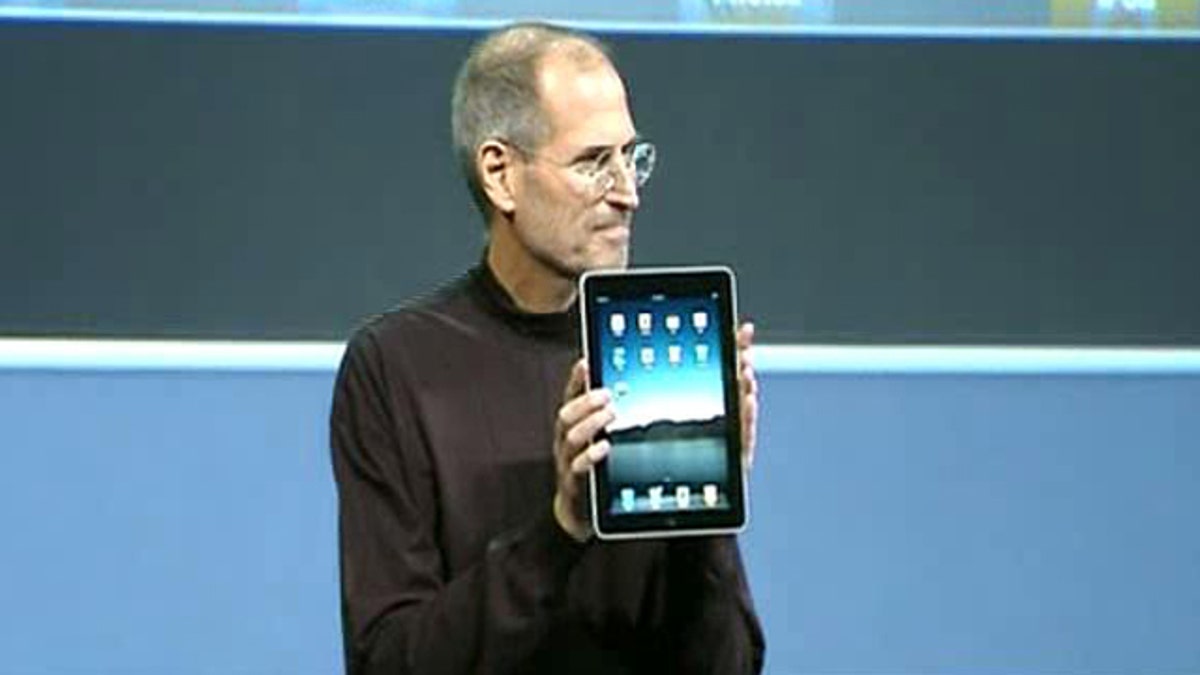
During his keynote speech, Steve Jobs shows off the iPad at its January debut. (FoxNews)
In an escalating war of words, Adobe CTO Kevin Lynch tersely replied to Steve Jobs over Apple's refusal to allow Flash on its devices.
A letter Apple CEO Steve Jobs posted online Wednesday evening titled "Thoughts on Flash" offered reasons the company has prevented Flash from running on its gadgets. His arguments ran the gamut from philosophical issues about the nature of closed platforms to complaints about performance and crashes.
Now Adobe is fighting back.
First the company issued a statement that "Apple’s moves to block Flash and other technologies are designed to protect a business model that locks developers and consumers into a single, proprietary stack" -- a response to Apple's accusation that Flash is a closed platform.
"Any attempt to position this solely as a technology issue is a smokescreen," the statement added.
Then CTO Kevin Lynch posted an entry to Adobe's website titled "Moving Forward," in which he underscored the passion people feel about both Apple and Adobe technologies. "We feel confident that were Apple and Adobe to work together as we are with a number of other partners, we could provide a terrific experience with Flash on the iPhone, iPad and iPod touch," Lynch wrote.
He also sided with Adobe Flash evangelist Lee Brimelow, who had registered his disgust with Apple earlier in the month. Brimlow was upset about a developer agreement from Apple that makes it a violation of terms to use a non-sanctioned development language.
"Speaking purely for myself, I would look to make it clear what is going through my mind at the moment. Go screw yourself, Apple," Brimlow wrote.
Lynch seemingly agreed, indicating the restrictive contract developers must agree to was forcing Adobe to abandon development for Apple's platforms.
"Given the legal terms Apple has imposed on developers, we have already decided to shift our focus away from Apple devices for both Flash Player and AIR," he explained.
Jobs had not commented on Brimelow's words, but his letter is clearly the company's official position statement. In it, Jobs questioned the closed nature of the Flash video format, arguing instead for the upcoming open standard HTML5, Flash's chief competitor.
"HTML5 is completely open and controlled by a standards committee, of which Apple is a member," he explains.
Jobs also suggests that Flash is old, describing videos encoded through with other compression technologies as H.264 as "more modern formats." The largest issue seems to be the performance problem. Jobs describes Flash as "the number one reason Macs crash."
He also complains about performance. But the main issue?
"We know from painful experience that letting a third party layer of software come between the platform and the developer ultimately results in sub-standard apps and hinders the enhancement and progress of the platform," Jobs argues.
"We cannot be at the mercy of a third party deciding if and when they will make our enhancements available to our developers."
PCMag.com editor in chief Lance Ulanoff wasn't surprised that Jobs fought back so publicly. "There's tremendous frustration on both sides, and a lot is at stake," he told FoxNews.com, describing Jobs' missive as "well reasoned...with the occasional zinger in there."
But more than anything, Ulanoff wonders if Apple's public scolding of Adobe may be the beginning of the end for the Flash technology.
"This seemingly well-reasoned letter from one of the most important technology companies in the world can have devastating effects" on future development, he pointed out, both by independent developers and by Adobe itself.
"It's an incredible attack on Flash, and could shake its very foundations," he said.








































